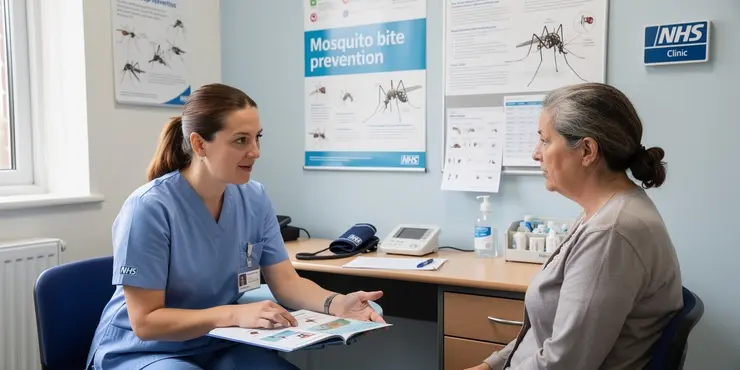
Find Help
More Items From Ergsy search
-

What role do fruit bats play in Nipah Virus transmission?
Relevance: 100%
-

How is Nipah Virus transmitted?
Relevance: 91%
-

Is there a cure for Nipah Virus?
Relevance: 90%
-

What is Nipah Virus?
Relevance: 90%
-

Can Nipah Virus cause outbreaks?
Relevance: 85%
-

Which animals are known to carry Nipah Virus?
Relevance: 85%
-

Can Nipah Virus be transmitted from person to person?
Relevance: 83%
-

Why are Nipah Virus outbreaks considered a public health concern?
Relevance: 79%
-

Where was Nipah Virus first identified?
Relevance: 78%
-

How is Nipah Virus controlled during outbreaks?
Relevance: 78%
-

What regions are most at risk for Nipah Virus outbreaks?
Relevance: 78%
-

Can Nipah Virus cause neurological complications?
Relevance: 77%
-

How is Nipah Virus diagnosed?
Relevance: 77%
-

What global organizations are involved in Nipah Virus research?
Relevance: 77%
-

Has a vaccine been developed against Nipah Virus?
Relevance: 75%
-

What should someone do if they suspect Nipah Virus infection?
Relevance: 74%
-

What preventive measures can reduce the risk of Nipah Virus infection?
Relevance: 73%
-

What are the symptoms of Nipah Virus infection?
Relevance: 73%
-

What is the mortality rate of Nipah Virus infection?
Relevance: 71%
-

Are new variants more transmissible?
Relevance: 49%
-

How is the Zika virus transmitted?
Relevance: 44%
-

How is Chikungunya virus transmitted?
Relevance: 43%
-

How is the Marburg virus transmitted?
Relevance: 42%
-

How is West Nile Virus transmitted?
Relevance: 42%
-

What is the Ebola virus?
Relevance: 41%
-

Are UK mosquitoes capable of transmitting Zika virus?
Relevance: 40%
-

Can Marburg virus disease be prevented?
Relevance: 40%
-

Does the UK have Zika virus?
Relevance: 39%
-

Can Zika virus be spread from person to person in the UK?
Relevance: 39%
-

What is Nipah Virus?
Relevance: 39%
-

How is blood screened to prevent disease transmission?
Relevance: 39%
-

Is Zika virus present in the UK?
Relevance: 39%
-

Can men in the UK transmit Zika virus if infected?
Relevance: 39%
-

Is the Marburg virus related to the Ebola virus?
Relevance: 39%
-
Is Zika virus screened for in blood transfusions?
Relevance: 38%
-

Should UK travelers be concerned about Zika virus?
Relevance: 36%
-

What research is being done on the Marburg virus?
Relevance: 36%
-

What is the Marburg Virus?
Relevance: 36%
-

Is the UK government providing guidance on Zika virus for travelers?
Relevance: 35%
-

How prevalent is West Nile virus in the UK?
Relevance: 35%
Overview of Nipah Virus Transmission
Nipah virus is a zoonotic virus, meaning it is transmitted from animals to humans. The natural hosts of the virus are fruit bats, specifically those of the Pteropus genus. This virus can cause severe illness in humans and is associated with high mortality rates. Understanding the transmission routes of Nipah virus is crucial for preventing outbreaks, especially in regions where the virus is prevalent.
Transmission from Animals to Humans
The primary mode of transmission of Nipah virus from animals to humans is through direct contact with infected animals or their bodily fluids. Fruit bats, the natural carriers of Nipah virus, can shed the virus through their saliva, urine, or feces. Humans may become infected by consuming food products contaminated by these secretions. For instance, in some cases, human infections have been linked to the consumption of raw date palm sap contaminated by bat urine or saliva.
Additionally, domestic animals such as pigs can act as intermediate hosts. Infected pigs can transmit the virus to humans through direct contact or exposure to contaminated farm environments. This was notably observed during outbreaks in Malaysia and Singapore, where pig farms were associated with the spread of the virus to humans.
Human-to-Human Transmission
Besides animal-to-human transmission, Nipah virus can also spread between humans. Human-to-human transmission primarily occurs through close contact with an infected person's respiratory secretions or bodily fluids. This is particularly common in healthcare settings where caregivers may be in close proximity to patients. Infection can occur through exposure to respiratory droplets, contaminated surfaces, or direct contact with infected individuals.
Human-to-human transmission has been observed in familial and hospital settings, particularly during the outbreaks in Bangladesh and India. The risk of transmission is higher when infection control practices are not adequately implemented, highlighting the importance of stringent health measures in preventing the spread of the virus.
Prevention and Control
Preventing Nipah virus transmission involves controlling the sources of infection and implementing effective public health measures. For animal-to-human transmission, it is crucial to minimize contact with fruit bats and infected animals. This includes avoiding consumption of raw foods contaminated by bat secretions and maintaining proper hygiene and biosecurity measures in farms.
In addressing human-to-human transmission, especially in healthcare facilities, it is essential to enforce strict infection control practices. This includes the use of personal protective equipment, isolation of infected patients, and proper sanitation procedures. Public awareness and community engagement are equally vital in controlling the spread of the virus and mitigating potential outbreaks.
What is Nipah Virus?
Nipah virus is a type of germ that can make people very sick. It comes from animals. The animals that carry this virus are fruit bats. It is important to know how this virus spreads so we can stop it.
How People Get Nipah Virus from Animals
People can catch the Nipah virus from animals in several ways. The virus is in fruit bats' spit, pee, and poo. People can get sick if they eat food that has touched bat pee or spit. For example, some people got sick from drinking raw date palm sap with bat pee or spit on it.
Sometimes, other animals like pigs can get the virus from bats. Then people can get the virus from these pigs by touching them or being near them. This happened in places like Malaysia and Singapore on pig farms.
How People Give Nipah Virus to Each Other
People can also give the virus to each other. This usually happens when they are very close to someone who is sick, like touching their spit or snot. This can happen in hospitals or at home if someone is taking care of a sick person.
The virus spread among families and hospital staff in places like Bangladesh and India. It's important for hospitals to follow health rules to stop the virus from spreading.
How to Stop the Spread of Nipah Virus
To stop Nipah virus, we need to control how it spreads. We need to stay away from bats and sick animals. Don't eat raw food that might have bat pee or spit on it. Farmers should keep farms clean.
In hospitals, doctors and nurses should use gloves and masks and keep sick people away from others. Clean everything well. People should learn how to stop the virus so we can be safe from outbreaks.
Frequently Asked Questions
What is the primary host of the Nipah virus?
Fruit bats, also known as flying foxes, are the primary natural hosts of the Nipah virus.
Can the Nipah virus be transmitted from person to person?
Yes, Nipah virus can be transmitted through direct contact with an infected person's body fluids, such as saliva or urine.
How do fruit bats transmit the Nipah virus to humans?
Fruit bats can contaminate food sources like raw date palm sap with their saliva or urine. Humans can become infected by consuming such contaminated food.
Can domestic animals transmit Nipah virus to humans?
Yes, domestic animals like pigs can be intermediaries in Nipah virus transmission to humans, often after getting infected from bats.
Is Nipah virus airborne?
There is no strong evidence to suggest Nipah virus is airborne, though close contact with respiratory droplets from an infected person could pose a risk of transmission.
Can Nipah virus spread through contaminated objects?
Yes, transmission can occur through contact with surfaces or objects contaminated with the virus, though this is less common than direct contact.
Is it safe to eat fruits bitten by bats?
No, eating fruits that have been bitten by bats is not safe as it can be a source of Nipah virus infection.
Can Nipah virus transmission occur between animals and humans?
Yes, Nipah virus can be transmitted from animals (such as bats or pigs) to humans.
Can the Nipah virus spread through blood transfusion?
There is no documented evidence of Nipah virus spreading through blood transfusion.
Is consuming cooked meat from infected animals safe?
Properly cooked meat is usually safe as high temperatures inactivate the virus, but care should be taken to avoid cross-contamination.
How is contamination of date palm sap prevented?
Using physical barriers like covers or guards can prevent bats from accessing and contaminating the sap.
Can Nipah virus survive in the environment?
Nipah virus does not survive long outside the host, but it can persist on surfaces for a short duration under certain conditions.
Is person-to-person transmission common in Nipah outbreaks?
Yes, person-to-person transmission has been observed, particularly in healthcare settings without proper infection control.
How can animal-to-human transmission be reduced?
Avoiding direct contact with animals or their secretions in endemic areas reduces the risk of transmission.
Does the Nipah virus transmit through water?
There is no evidence to support waterborne transmission of Nipah virus.
Can Nipah virus be transmitted through breastfeeding?
There is limited data on transmission through breastfeeding, but it's generally considered low-risk if precautions are taken.
Is Nipah virus found in all types of bats?
While primarily associated with fruit bats, the virus has been found in other bat species, though transmission dynamics differ.
How is healthcare worker transmission prevented?
Use of personal protective equipment (PPE) and strict adherence to infection control protocols prevent transmission in healthcare settings.
Can Nipah virus be transmitted through feces?
Transmission through feces is not well-documented, with the primary concern being body fluids like saliva and urine.
Are all pigs infected with Nipah virus dangerous to humans?
Only pigs that are infected with the Nipah virus pose a transmission risk to humans.
What animal does the Nipah virus live in?
Fruit bats are animals that fly. They look like big bats and are called flying foxes. They are the main animals that carry the Nipah virus.
Can people catch the Nipah virus from other people?
Yes, people can catch the Nipah virus from other people. This means if a person is sick with the Nipah virus, they can spread it to someone else. To stay safe, it is important to keep away from anyone who is sick with the virus.
Ways to stay safe:
- Wash your hands often with soap and water.
- Wear a mask if you are near someone who is sick.
- Try not to touch your face if your hands are not clean.
Yes, Nipah virus can spread if you touch an infected person's saliva or pee.
How do fruit bats give the Nipah virus to humans?
Fruit bats can make food dirty. They can do this with their spit or pee. This can happen to food like raw date palm sap. People can get sick if they eat this dirty food.
Can pets give Nipah virus to people?
Pets are animals we keep at home, like dogs and cats. They can sometimes carry germs that make people sick. One of these germs is called the Nipah virus. It is important to know if pets can pass this virus to their owners.
If you have a pet, there are ways to keep safe:
- Wash your hands with soap after touching animals.
- Keep pets clean and healthy with regular vet visits.
- Watch for signs if your pet looks sick and tell a vet.
These steps can help keep you and your pet safe.
Yes, farm animals like pigs can spread the Nipah virus to people. They usually get the virus from bats.
Can the Nipah virus spread through the air?
There is no strong proof that the Nipah virus travels through the air. But if you are very close to someone who is sick and they cough or sneeze on you, you might catch it.
Here are some things that can help keep you safe:
- Wash your hands often with soap and water.
- Stay away from people who are sick.
- Wear a mask if you are near someone coughing or sneezing.
Can Nipah virus spread by touching things?
Yes, Nipah virus can be spread by touching things that have the virus on them. This means if someone sick with Nipah virus touches an object, the virus can stay there. If you then touch that object and touch your mouth or face, you could get sick.
To stay safe, wash your hands often with soap and water. You can also use hand sanitizer. Try not to touch your face if your hands are not clean.
Yes, you can catch the virus if you touch things that have germs on them. But this does not happen as much as catching it from people.
Can you eat fruit that bats have bitten?
If you see a fruit with bites from bats, it is best not to eat it. The bite can make the fruit unsafe.
Here are some tips:
- Look for fruits without bites.
- Wash fruits before eating.
- Ask an adult if you are unsure.
No, it is not safe to eat fruits bitten by bats. This can spread a disease called the Nipah virus.
Can people catch Nipah virus from animals?
Yes, Nipah virus can spread from animals like bats or pigs to people.
Can Nipah virus spread if you get blood from someone else?
There is no proof that Nipah virus can spread through blood transfusion.
Is it safe to eat cooked meat from sick animals?
Cooked meat is safe to eat because hot temperatures kill the virus. But be careful not to mix cooked meat with raw things that could have germs.
How do we keep date palm sap clean and safe?
Putting covers or guards over the trees can stop bats from getting to the sap and making it dirty.
Can Nipah virus live outside the body?
We can talk about if Nipah virus can live outside a person or an animal. When we say "environment," we mean places like air, water, or on surfaces.
Here are some simple ideas about Nipah virus:
- Nipah virus does not live very long outside a body.
- It likes to stay warm and wet, like inside a body.
- It might be on things for a short time, like a few hours.
- We can kill it by cleaning with soap or disinfectants.
Here are some tips to stay safe:
- Wash your hands with soap often.
- Clean surfaces at home with cleaning products.
- Keep away from people who are very sick.
If you want help understanding this, ask someone you trust to explain it to you. You can also draw pictures to help remember.
The Nipah virus cannot live long outside of the body, but it can stay on things for a little while if the conditions are right.
Can Nipah spread easily from one person to another?
Yes, the illness can spread from one person to another. This happens a lot in hospitals if people are not careful to stop germs from spreading.
How can we stop animals from making people sick?
Stay away from touching animals or their droppings in places where diseases are common. This helps you stay healthy.
Can Nipah virus spread in water?
The Nipah virus does not spread in water.
There is no proof that Nipah virus spreads through water.
Can a mom give Nipah virus to her baby when breastfeeding?
If you are worried about Nipah virus, talk to a doctor or nurse.
Ask them to help you understand how you can keep your baby safe.
Scientists do not have a lot of information about spreading germs through breastfeeding. But if you are careful, it is usually not risky.
Do all bats have the Nipah virus?
Not all bats have Nipah virus. Some bats might have it, but not every bat does.
To understand better, use pictures of different types of bats.
The virus is mostly found in fruit bats. But other bats can have it too. The way the virus spreads is different in different bats.
How do we stop healthcare workers from getting sick?
It is important to keep doctors and nurses safe from sickness. Here are some ways to help:
- Wear gloves and masks to stop germs.
- Wash hands often with soap and water.
- Use special cleaning liquids to clean surfaces.
- Get the right vaccines to stay healthy.
These steps help keep everyone safe. You can use pictures or videos to learn more about these steps. They make it easier to understand.
Wear special safety clothes (PPE) like masks and gloves. Follow rules to stop germs from spreading in places like hospitals. This helps keep everyone safe and healthy.
For more help, use picture guides or talk with someone who knows about safety in these places.
Can Nipah virus spread through poop?
Poop doesn't usually spread the sickness. The main worry is stuff like spit and pee.
Can all pigs with Nipah virus make people sick?
Some pigs have Nipah virus. Not all of them make people sick. But it is better to stay safe:
- Avoid touching sick pigs.
- Wash hands after being near pigs.
- Ask grown-ups for help if you are worried.
Only pigs that have the Nipah virus can spread it to people.
Useful Links
This website offers general information and is not a substitute for professional advice.
Always seek guidance from qualified professionals.
If you have any medical concerns or need urgent help, contact a healthcare professional or emergency services immediately.
Some of this content was generated with AI assistance. We’ve done our best to keep it accurate, helpful, and human-friendly.
- Ergsy carfully checks the information in the videos we provide here.
- Videos shown by Youtube after a video has completed, have NOT been reviewed by ERGSY.
- To view, click the arrow in centre of video.
- Most of the videos you find here will have subtitles and/or closed captions available.
- You may need to turn these on, and choose your preferred language.
- Go to the video you'd like to watch.
- If closed captions (CC) are available, settings will be visible on the bottom right of the video player.
- To turn on Captions, click settings .
- To turn off Captions, click settings again.
More Items From Ergsy search
-

What role do fruit bats play in Nipah Virus transmission?
Relevance: 100%
-

How is Nipah Virus transmitted?
Relevance: 91%
-

Is there a cure for Nipah Virus?
Relevance: 90%
-

What is Nipah Virus?
Relevance: 90%
-

Can Nipah Virus cause outbreaks?
Relevance: 85%
-

Which animals are known to carry Nipah Virus?
Relevance: 85%
-

Can Nipah Virus be transmitted from person to person?
Relevance: 83%
-

Why are Nipah Virus outbreaks considered a public health concern?
Relevance: 79%
-

Where was Nipah Virus first identified?
Relevance: 78%
-

How is Nipah Virus controlled during outbreaks?
Relevance: 78%
-

What regions are most at risk for Nipah Virus outbreaks?
Relevance: 78%
-

Can Nipah Virus cause neurological complications?
Relevance: 77%
-

How is Nipah Virus diagnosed?
Relevance: 77%
-

What global organizations are involved in Nipah Virus research?
Relevance: 77%
-

Has a vaccine been developed against Nipah Virus?
Relevance: 75%
-

What should someone do if they suspect Nipah Virus infection?
Relevance: 74%
-

What preventive measures can reduce the risk of Nipah Virus infection?
Relevance: 73%
-

What are the symptoms of Nipah Virus infection?
Relevance: 73%
-

What is the mortality rate of Nipah Virus infection?
Relevance: 71%
-

Are new variants more transmissible?
Relevance: 49%
-

How is the Zika virus transmitted?
Relevance: 44%
-

How is Chikungunya virus transmitted?
Relevance: 43%
-

How is the Marburg virus transmitted?
Relevance: 42%
-

How is West Nile Virus transmitted?
Relevance: 42%
-

What is the Ebola virus?
Relevance: 41%
-

Are UK mosquitoes capable of transmitting Zika virus?
Relevance: 40%
-

Can Marburg virus disease be prevented?
Relevance: 40%
-

Does the UK have Zika virus?
Relevance: 39%
-

Can Zika virus be spread from person to person in the UK?
Relevance: 39%
-

What is Nipah Virus?
Relevance: 39%
-

How is blood screened to prevent disease transmission?
Relevance: 39%
-

Is Zika virus present in the UK?
Relevance: 39%
-

Can men in the UK transmit Zika virus if infected?
Relevance: 39%
-

Is the Marburg virus related to the Ebola virus?
Relevance: 39%
-
Is Zika virus screened for in blood transfusions?
Relevance: 38%
-

Should UK travelers be concerned about Zika virus?
Relevance: 36%
-

What research is being done on the Marburg virus?
Relevance: 36%
-

What is the Marburg Virus?
Relevance: 36%
-

Is the UK government providing guidance on Zika virus for travelers?
Relevance: 35%
-

How prevalent is West Nile virus in the UK?
Relevance: 35%


